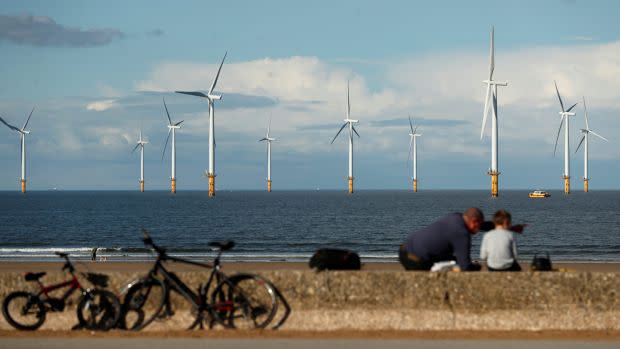Europe’s record power prices are a case for more renewables, not fewer

Prices for electricity in the UK and Europe reached record highs this week, with average household bills for the month of August expected to be at least 20% higher than normal and several electricity retailers forced out of business by crippling wholesale prices. The spike was caused by a combination of rising carbon credit prices, low output from wind farms, transmission infrastructure outages, and skyrocketing prices for natural gas.
But while some European lawmakers seized on the energy crisis to criticize the bloc’s growing reliance on renewable energy, the biggest problem is really the volatile price of natural gas—and the solution is more zero-carbon energy, not less.
Why electricity prices have risen so fast
The price of natural gas in Europe, which typically supplies about one-fifth of the bloc’s electricity, has nearly quadrupled since January. Driving this trend is the post-pandemic economic recovery; the fact that reserves were mostly drained earlier in the year to heat homes during an unseasonably cold winter; a shortfall in gas deliveries from major suppliers like Algeria and Russia; and surging competition for liquified natural gas (LNG) shipments with China and other Asian countries, where it is increasingly used to replace coal.
Natural gas and carbon prices are driving up the cost of electricity
As a result, electricity prices were already rising even as wind farms in the North Sea began to experience below-average output—which forced grid operators to rely more on natural gas, driving the electricity price still higher. Coal-fired power plants, meanwhile, are being forced into closure both by legislation and by high prices for carbon pollution permits.
On Sept. 14, Frans Timmermans, the EU Commission's top climate official, said that carbon pricing was responsible for about one-fifth of the electricity price spike, with the rest due mainly to the price of gas. The crunch is likely to continue as temperatures fall in the coming months.
Natural gas price volatility will grow as a risk the more Europe, Asia, and the rest of the world rely on the energy source as a bridge away from coal. To break that cycle, Timmermans said, countries must accelerate their build-out of renewables—which, when the sun is shining and wind is blowing, are by far the cheapest source of electricity—and to create more utility-scale energy storage, as well as improving transmission linkages across the continent, for times when those sources are intermittent.
The bloc is also considering a package of climate legislation, part of which will redistribute funds raised through carbon taxes to low-income households struggling with high bills.
Sign up for the Quartz Daily Brief, our free daily newsletter with the world’s most important and interesting news.
More stories from Quartz:
